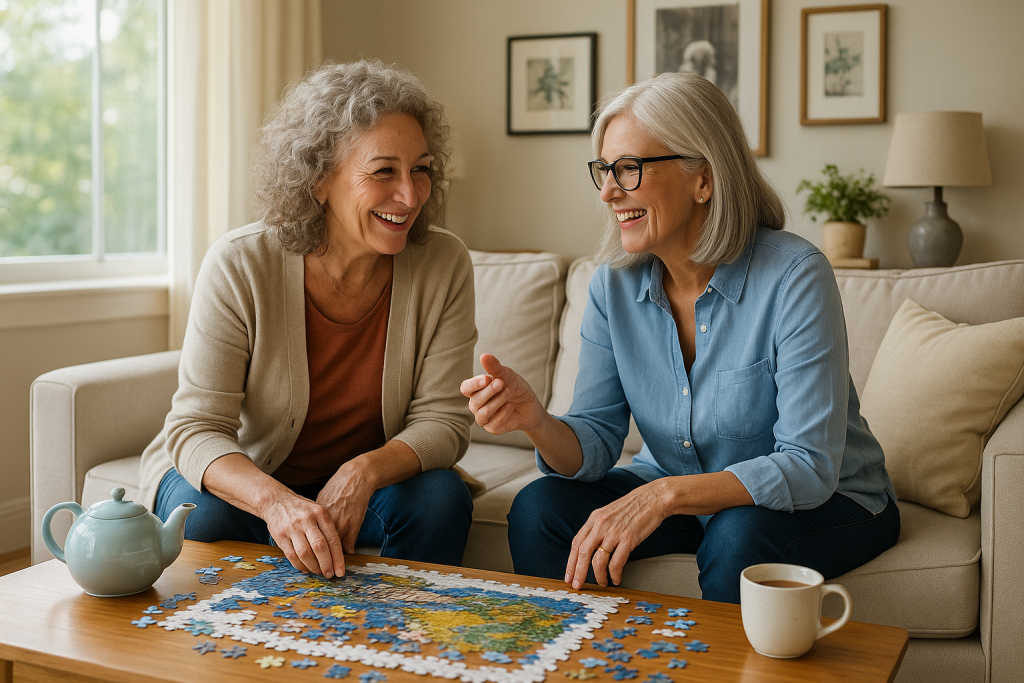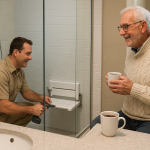I’ve experienced firsthand how a simple hobby can transform an ordinary day into a deeply satisfying one. Sculpting became my ongoing passion project—without a doubt.
So, when I think about the importance of hobbies for seniors at home, I see how these activities become lifelines. Hobbies of any kind can boost emotional well-being, keep minds sharp, and encourage physical activity while aging in place.
“I absolutely love having hobbies and can’t imagine not having any. In this article, I talk about how hobbies can be a kind of lifeline—but honestly, I think they’re even more important than that. Finding a hobby you’re truly in sync with can help you center yourself—especially if it connects with you on a deeper level, as it does for me with the creative arts.”
The right hobby can change everything. It can turn a quiet afternoon into an adventure. It can connect you with others who share your interests. Best of all, it can remind you that every day holds potential for joy and new discoveries.
For seniors that have chosen to age in place, hobbies offer structure and purpose. They create routines that matter. They provide goals to work toward. And they remind us that learning and growing never stop, no matter our age.
Adult children of seniors often worry about their parents’ daily fulfillment. The good news is that hobbies for seniors can address those concerns. Hobbies combat loneliness, provide mental stimulation, and sometimes offer gentle physical activity. Plus, many can be enjoyed right from home.
Whether you’re exploring hobbies for retirees, hobbies for men or even hobbies for women, the following activities can enrich daily life in meaningful ways.
Cultivating Wellness and Purpose
Gardening stands out among hobbies for seniors because it touches every aspect of well-being. I’ve watched seniors light up when they talk about their plants. There’s something magical about nurturing life and watching it grow.
The physical benefits are immediate. Gardening encourages light to moderate physical activity without feeling like exercise. You’ll bend, reach, and move in natural ways. Your hands stay busy, which helps maintain dexterity and strength.
But the mental benefits run even deeper. Contact with nature reduces stress and anxiety. The simple act of touching soil and breathing fresh air can shift your entire mood. Sunlight provides vitamin D, which supports both physical and mental health.
Indoor Gardening Options for Seniors
“My first garden was a small balcony overlooking a marina. I grew herbs, tomatoes, and perennials in mismatched terracotta pots. It was a tough time in my life but tending that little garden grounded me. It gave me purpose and pulled my focus away from the struggles I was facing. I’ve loved being in a garden ever since—and I think it all traces back to those early days, nearly forty years ago, when that tiny container garden became my escape.”
Not everyone has outdoor space, but that doesn’t mean you can’t garden. Indoor bonsai gardening offers a perfect blend of patience and mindfulness. These tiny trees require attention but not overwhelming care. They teach you to slow down and notice small changes.
Window herb gardens provide year-round benefits. Imagine stepping into your kitchen and picking fresh basil for your pasta sauce. The scents alone can brighten your day. Plus, you’ll always have fresh ingredients for cooking.
Aerogarden and hydroponic kits have revolutionized indoor gardening. These systems take the guesswork out of growing plants. They’re perfect for seniors who want to garden but worry about maintaining traditional plants.
Making Gardening Accessible
“You can also hang a planting bag from the ceiling or a large wall hook. Some even come pre-filled with growing medium and a starter plant—like the ones designed for tomatoes. As the plant grows, it hangs downward along with the fruit. You just water it like you would a regular hanging flower basket.”
The key to gardening as one of the best hobbies for seniors is adaptation. Raised beds and vertical planters bring plants within easy reach. No more bending down to ground level. You can garden comfortably from a chair or with minimal stooping.
Lightweight, grip-enhanced tools make gardening arthritis-friendly. These tools reduce strain on hands and wrists. They’re designed specifically for seniors who want to keep gardening despite physical challenges.
Creative Arts and Crafts: Expressing Your Inner Artist
Creative hobbies for seniors offer something special – the chance to express yourself and create something beautiful. I’ve seen seniors discover artistic talents they never knew they had. Age doesn’t limit creativity; it often enhances it.
Arts and crafts enhance fine motor skills while providing cognitive engagement. Your hands and mind work together in new ways. This coordination helps maintain brain health and keeps fingers nimble.
These activities also provide emotional expression and stress relief. When words aren’t enough, art can speak for you. Whether you’re happy, sad, or somewhere in between, creating something helps process those feelings.
Modern Creative Options
Adult coloring books have become incredibly popular among seniors. They’re not childish – they’re therapeutic. The repetitive motions and focus required can be deeply relaxing. Plus, you end up with something beautiful to display or share.
Digital art on tablets opens new possibilities for tech-savvy seniors. You can create without worrying about running out of supplies. Mistakes are easy to fix. And you can share your creations instantly with family and friends.
Quilting serves as both a creative outlet and a legacy project. Many seniors find deep satisfaction in creating quilts for grandchildren or great-grandchildren. Each stitch carries love and memories.
Getting Started with Creative Hobbies
Local supply delivery services make it easy to get craft materials. You don’t need to make difficult trips to craft stores. Everything you need can come right to your door.
Virtual art workshops for seniors are growing in popularity. These classes build community while teaching new skills. You can learn alongside others from the comfort of your home.
Cooking and Baking: Nourishing Body and Soul
Cooking and baking rank high among hobbies for seniors because they engage all your senses. The sizzle of onions in a pan, the smell of fresh bread, the satisfaction of a perfectly seasoned dish – these experiences enrich daily life.
These hobbies promote nutrition awareness and meal creativity. You’ll think more about what you eat and how to make it delicious. This awareness often leads to better eating habits and improved health.
Social Cooking Ideas
Baking small batches for neighbors creates wonderful social connections. A plate of cookies or a loaf of bread becomes a bridge to friendship. These simple gestures strengthen community bonds.
Learning healthy snack recipes benefits your daily nutrition. You’ll discover new flavors while supporting your health. Plus, you’ll have interesting stories to share about your culinary adventures.
Making Cooking Accessible
Pre-chopped ingredient kits help seniors with arthritis or mobility limitations continue cooking. These kits remove the most challenging prep work while letting you enjoy the creative process.
Anti-fatigue mats provide safer kitchen standing. They reduce strain on legs and back, making cooking more comfortable. Safety and comfort are crucial for enjoying cooking as a hobby.
Reading and Writing: Exercising Your Mind
Reading and writing stand out as perfect hobbies for seniors because they’re accessible, affordable, and infinitely varied. I’ve seen seniors discover new authors in their 80s and fall in love with genres they never tried before.
Reading enhances memory, focus, and relaxation. It takes you to different worlds and introduces you to new ideas. Whether you prefer fiction or non-fiction, reading keeps your mind active and engaged.
Writing for Legacy and Joy
Writing fosters creativity, reflection, and legacy building. You might write about your childhood, document family recipes, or try your hand at poetry. Each word you write preserves memories and shares wisdom.
Joining virtual book clubs provides discussion and connection. You’ll meet others who share your love of reading. These connections can grow into meaningful friendships.
Writing memoir snippets or family recipe books creates lasting legacies. Your grandchildren will treasure these personal glimpses into your life and experiences.
Adaptive Reading and Writing Tools
Voice-to-text software enables hands-free writing. You can create stories, letters, or journals without typing. This technology makes writing accessible for seniors with arthritis or other hand challenges.
Magnifying bookmarks make reading comfortable regardless of vision changes. You don’t have to give up reading because of age-related vision issues. These simple tools can make all the difference.
Puzzles and Games: Sharpening Your Mind
Puzzles and games offer some of the most engaging hobbies for seniors. They improve problem-solving skills, memory, and concentration. Plus, they can be enjoyed alone or with others.
The mental workout you get from puzzles helps maintain cognitive function. It’s like going to the gym for your brain. Regular mental exercise can help keep your mind sharp as you age.
Modern Puzzle Options
Brain training apps designed for seniors bring puzzles into the digital age. These apps adjust difficulty based on your performance. They make mental exercise convenient and personalized.
Large-piece 3D puzzles offer an extra challenge beyond traditional flat puzzles. They engage spatial thinking and provide a sense of accomplishment when completed.
Accessible Gaming
Simplified crosswords work well for seniors with cognitive conditions. They provide mental stimulation without overwhelming difficulty. Success builds confidence and encourages continued engagement.
Online game platforms with senior-friendly interfaces make digital gaming accessible. Large buttons, clear instructions, and patient pacing help seniors enjoy online gaming.
Virtual Exploration: Discovering the World from Home
Virtual exploration represents one of the most exciting modern hobbies for seniors. Technology lets you travel the world, visit museums, and attend concerts from your living room.
This hobby expands cultural horizons and nurtures curiosity. You can explore ancient ruins, tour famous galleries, or attend lectures at prestigious universities. The world becomes your classroom.
Active Virtual Engagement
Live virtual exercise classes that incorporate global dance styles combine physical activity with cultural exploration. You might learn salsa from Cuba or line dancing from Tennessee.
Guided meditation or nature sound livestreams provide relaxation and stress relief. These sessions can transport you to peaceful forests or ocean beaches.
Music and Dance: Moving to Your Own Beat
Music and dance offer joyful hobbies for seniors that boost mood, cognitive function, and coordination. Music has the power to transport you to different times and places instantly.
These activities encourage physical activity, even while seated. Chair dancing provides gentle exercise. Singing exercises your lungs and diaphragm. Both activities release endorphins that improve mood.
Learning New Musical Skills
Learning ukulele or simple percussion instruments creates cognitive and motor skill synergy. These instruments are easier to learn than piano or guitar but still provide mental stimulation.
Virtual group sing-alongs create social connections. You can join others in singing familiar songs. These sessions often become highlights of the week for participants.
Adaptive Music and Dance
Using wrist or ankle bells enables seated rhythmic dance movement. You can participate in the joy of dance even with mobility limitations. The bells add a festive sound to your movements.
Volunteering from Home: Making a Difference
Volunteering ranks among the most meaningful hobbies for seniors. It provides purpose, structure, and the satisfaction of helping others. Modern technology makes it possible for virtual volunteering effectively from home.
Remote volunteering offers flexibility and accessibility. You can contribute to causes you care about without transportation challenges. Your experience and wisdom become valuable resources for organizations.
Creative Volunteer Opportunities
Recording audiobook readings for children’s programs combines your love of reading with helping others. Your voice can bring stories to life for young listeners.
Creating handmade cards for hospitals or deployed troops uses your creative skills for meaningful purposes. These personal touches brighten someone’s day.
Virtual advocacy or fundraising campaigns let you support causes you believe in. Your phone calls and emails can make a real difference in important issues.
Technology-Based Hobbies: Embracing the Digital Age
Technology-based hobbies for seniors encourage tech comfort while providing cognitive challenges and social connections. Don’t let age stereotypes limit your digital exploration.
These hobbies keep you connected to family and friends. They also open up new worlds of learning and entertainment. Technology can enhance rather than complicate your daily life.
Practical Digital Hobbies
Learning basic photo editing helps organize family photos. You can create albums, enhance old pictures, and share memories with relatives. These skills preserve precious moments.
Exploring genealogy and building family trees uncovers fascinating family history. You might discover relatives you never knew existed or learn surprising facts about your ancestors.
Joining senior-focused online communities for shared hobbies connects you with like-minded people. Whether you love gardening, cooking, or crafts, you’ll find others who share your interests.
Tips for Choosing the Right Hobbies for Seniors
Selecting hobbies for seniors requires thoughtful consideration. Start by reflecting on past passions and new curiosities. What did you love doing when you were younger? What have you always wanted to try?
Begin small – consistency builds comfort and confidence. Don’t pressure yourself to become an expert immediately, or ever. Just enjoy the learning process and celebrate each and every victory, no matter how small.
Choose activities that offer social connection opportunities. Hobbies for retirees work best when they combat isolation. Look for ways to share your interests with others.
Prioritize accessibility and adapt tools as needed. Don’t let physical limitations prevent you from enjoying hobbies. Seek assistance when needed and adapt activities to work for you.
The Transformative Power of Hobbies in Aging
“When I was a kid, hobby shows were full of amazing sights—but we always made a beeline for the room with the massive model railways. There were usually half a dozen giant layouts, each one run by white-haired men in striped engineer caps, standing proudly behind their creations. The detail, the scope, the engineering—it was mesmerizing. To us kids, these old guys were the rockstars of the hobby world. Now that I’ve become one of those ‘old guys,’ I can only imagine what it must have felt like to have a lineup of wide-eyed kids waiting just to ask you a question. Those shows were nothing short of magical, and the craftsmanship I saw there left a lasting impression. It shaped how I saw creativity and inspired how I approached just about everything I did from that point on.”
Hobbies for seniors transform daily life into a fulfilling, connected experience. They support physical health through gentle activity. They maintain mental sharpness through cognitive engagement. They nurture emotional well-being through creative expression and social connection.
For adult children of seniors, encouraging hobbies can ease concerns about a parent’s daily engagement and fulfillment. These activities provide natural conversation starters and shared experiences that strengthen family bonds.
The beauty of hobbies for seniors lies in their diversity. Whether you prefer hobbies for men focused on woodworking or model building, or hobbies for women centered on crafts or gardening, there’s something for everyone. Many activities work equally well for all seniors, regardless of gender.
Keys to Staying Connected to Life’s Joy
Hobbies are more than just ways to pass time. They’re keys to staying connected to yourself, to others, and to the joy of life itself. Every day holds potential for discovery, creation, and connection when you have meaningful hobbies.
The right hobby can turn an ordinary afternoon into an adventure. It can connect you with others who share your interests. Most importantly, it can remind you that growth and learning never stop, no matter your age.
For seniors aging in place, hobbies provide the structure and purpose that make each day meaningful. They offer gentle physical activity, mental stimulation, and emotional fulfillment. They create routines that matter and goals worth pursuing.
Final Thoughts
Whether you choose gardening, crafts, cooking, reading, or any other activity, the key is to simply start. Choose something that sparks your curiosity. Begin with small steps. Allow yourself to enjoy the process of learning and growing.
Remember that companion care, whether seasonal or year-round, can support your hobby interests. Professional caregivers can help with transportation to craft stores, assist with setup, or simply provide companionship while you pursue your interests.
Your hobbies for seniors’ journey start with a single step. Take that step today. Your future self will thank you for the joy, purpose, and connection that hobbies bring to daily life.






